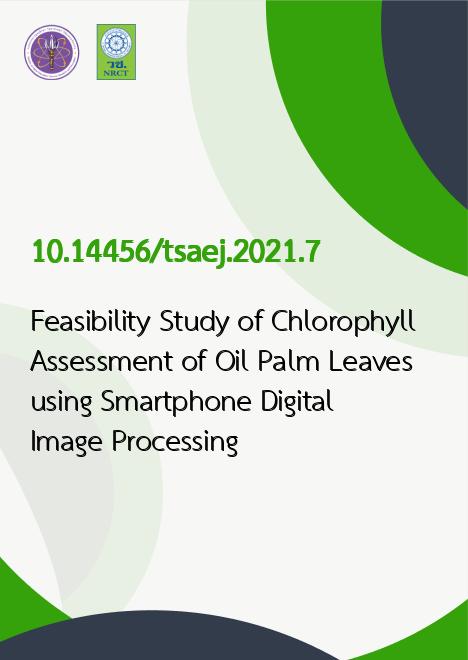
|
Feasibility Study of Chlorophyll Assessment of Oil Palm Leaves using Smartphone Digital Image Processing |
|---|---|
| รหัสดีโอไอ | |
| Creator | Rattapong Suwalak |
| Title | Feasibility Study of Chlorophyll Assessment of Oil Palm Leaves using Smartphone Digital Image Processing |
| Contributor | Pongsakorn Pongjaidee, Sittichock Siamkang, Anucha Bandasak, Kittisak Phetpan |
| Publisher | Thai Socities of Agricultural Engineering Journal |
| Publication Year | 2564 |
| Journal Title | Thai Socities of Agricultural Engineering Journal |
| Journal Vol. | 27 |
| Journal No. | 2 |
| Page no. | 1-6 |
| Keyword | Oil palm, Chlorophyll, Image processing, Smartphone camera |
| URL Website | www.tci-thaijo.org /index.php/TSAEJ |
| ISSN | 1685-408X |
| Abstract | This research aims to study the feasibility in applying the smartphone digital image processing technique for evaluating the chlorophyll content of oil palm leaves, and to study the influence of the different light illuminations on the model performance for the chlorophyll content prediction. Each sample was firstly analyzed for the chlorophyll level using a SPAD chlorophyll meter and then it was captured for the imagery using a smartphone digital camera under 2 different light illuminations. All data consisted of the imageries and corresponding chlorophyll values was split into 2 independent datasets: 40 samples for the training set and 10 samples for the test set. A stepwise multivariable linear regression was used for modeling. Three types of modeling were developed for studying the influence of the different light illuminations on the model performance: model A developed from a dataset taken under light illumination at 1,280 luxs, model B developed from a dataset taken under light illumination at 2,570 luxs, and model C developed from both such datasets. As the developed models, they provided the adjusted coefficient of determination (Adj-R2) and root mean square error (RMSE) of 0.656 and 3.5, 0.630 and 3.6, and 0.646 and 3.5 for the models A, B, and C, respectively. As the models validated by the test dataset, they exhibited the predictive performance with R2 and root mean square error of prediction (RMSEP) of 0.718 and 4.3, 0.679 and 4.4, and 0.691 and 4.4 for the models A, B and C, respectively. According to statistical test for comparing the average chlorophyll values predicted by the models A and B, the result showed that there is no statistically significant difference at 95% confident interval. This identified that two different light illuminations set up in this research do not affect the chlorophyll content prediction of oil palm leaves. |